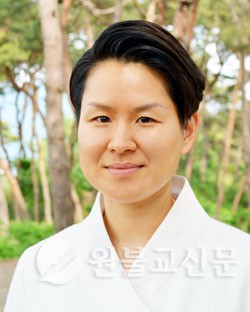
외국인 선방 회원 중 한 명이 최근 몇 주간 화를 자주 내게 되어, 우리는 지난 회화 시간 '화'에 대해 중점적으로 다루었다. 화를 유발하는 데에는 정서적 학대, 가난, 인종차별, 정신적 및 물리적 장애 등 많은 원인을 예로 들 수 있다. 화는 매우 자극적인 경험일 수 있기에, 우리는 주로 어떻게든 화를 부정하고 자신이 화를 냈다는 사실을 부끄러워한다. 그러나 실제로는 화가 문제가 아니라, 우리의 화에 대한 두려움이 문제이다. 화를 내는 것에도 지혜가 있기에, 우리는 화로부터 도망가지 않을 수 있는 용기가 필요하다. 화는 인간의 자연스러운 생존 에너지이다. 화를 받아들일 수 있는 용기가 있을 때, 우리는 그것을 직접 마주할 수 있게 된다. 그 때 우리는 화를 느끼고 화의 본질을 이해할 수 있게 된다.
베트남의 승려인 틱낫한은 "화는 고통스러워하고 울부짖는 아기와 같다. 화는 곧 자신의 아기이다. 아기는 자신을 안을 어머니가 필요하다. 자신의 아기를 안아주어라" 라고 말했다. '안는 것'은 우리가 우리의 화에 사로잡힌다는 뜻이 아니다. 충동에 따라 행동하는 것에 "네" 라고 하는 것도 아니고, 우리를 해칠 수 있는 외부 상황에 "네"라고 하는 것도 아니다. 이 "네"는 우리가 우리의 생각과 느낌이 자연스럽게 일어나고 기꺼이 지나가게 하는, '받아들임'의 내적 실천이다.
깨우친 화는 지혜의 명확함이며, 세상의 선(善)을 불러온다. 그 화는 어느 것이 건전하고 해로운 것인지 알며, 자기 내면의 폭력성, 불평등, 그리고 깊이 자리 잡은 무지함을 다룰 수 있도록 우리에게 용기와 동정심을 제공하고 행동하게 한다. 대종사 말씀하시기를 "나는 그대들에게 희·로·애·락의 감정을 억지로 없애라고 가르치는 것이 아니라, 희·로·애·락을 곳과 때에 마땅하게 써서 자유로운 마음 기틀을 걸림없이 운용하되 중도에만 어그러지지 않게 하라."〈대종경〉 수행품 37장
One of our One Circle Community members experienced a lot of anger the last few weeks, so we focused our last discussion on anger. There are so many things that trigger anger: emotional abuse, poverty, racism, mental and biological disorders. Because the experience of anger can be so potent, we usually try to get rid of it somehow and are embarrassed to acknowledge or accept that we could be feeling that way. Anger is not the problem, but our fear of anger. We need courage not to run away from our anger, because there is wisdom in anger too. Anger is a natural survival energy that wants our attention. When we have the courage to remain present with our anger, we can look directly at it. We can feel its texture and understand its qualities. The Vietnamese monk Thich Nhat Hanh once said: "Anger is like a howling baby, suffering and crying. Your anger is your baby. The baby needs his mother to embrace him. You are the mother. Embrace your baby." However "embracing" doesn't mean we let ourselves be possessed by our anger. We are not saying 'yes' to acting on our harmful impulses. Nor are we saying 'yes' to external circumstances that can hurt us. 'Yes' is an inner practice of acceptance in which we willingly allow our thoughts and feelings to naturally arise and pass away. The enlightened version of anger is the wisdom of clarity. This type of anger brings good to the world and sees what is wholesome and unwholesome. It causes us to act with courage and compassion to address violence, injustice, and entrenched ignorance. The Founding Master said, "It is not my instruction to have you eliminate by force your feelings of joy or anger, sorrow or happiness. Rather, I urge you to exercise your free frame of mind without constraint by applying joy, anger, sorrow, and happiness properly, according to time and place, only making sure that you do not diverge from the Middle Way."

